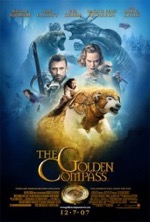The Golden Compass (PG-13)

Starring: Nicole Kidman
December 2007
“Gobblers and Witches and Bears…Oh, My!”
So what’s the big deal? Where’s the justification for all of the controversy? After hearing, ad nauseum, about the purportedly anti-God, anti-Catholic church themes in Philip Pullman’s novel-turned-movie the last few months, I just don’t see it. Sure there’s the whole communicating with spirits thing…and I suppose it doesn’t help that those animal companions are called daemons. Then there’s the Magisterium, the controlling body of monks, friars and priests, some of whom conspire in dark shadows like the Cigarette Man and his gang in the X-Files; but this certainly isn’t the first secret society ever to plot and scheme in the shady corner of a big screen, and just because many of them carry on like Jesuits doesn’t actually mean they are. After all, this is a fantasy world so we can suspend our disbelief, right?
The Golden Compass, the first book in Pullman’s His Dark Materials trilogy, features children far less adept at magic than those in the Harry Potter movies and a storyline far less epic than the one employed in Peter Jackson’s The Lord of the Rings trilogy. It’s commonly accepted that every fantasy story written since The Lord of the Rings trilogy has implemented, to some degree or dimension, J.R.R. Tolkien’s tropes, themes and iconography—the foundational elements for what we now refer to as fantasy fiction. Although certainly no exception to this assertion, Compass has blended the notable works of Tolkien, C.S. Lewis, J.K. Rowling and other celebrated fantasy scribes into a rich and intricate tapestry that challenges, if not utterly defies, genre conventions. Pullman’s pastiche includes a talking bear (Lewis), children attending a magical school (Rowling) and an epic battle between two massive armies on an arctic plain (Tolkien). The comparisons go on and on, but suffice it to say, the freshness here comes from the selective appropriation and clever cobbling together of story elements that originated inside the fertile imaginations of the aforementioned authors.
Early in the film, Lyra (Dakota Blue Richards) witnesses the abductions of her friends and her mission—and thereby the plot itself—becomes the attempt at locating and rescuing her companions from the lair of the nefarious Mrs. Coulter (Nicole Kidman). Along the way, Lyra encounters her uncle, Lord Asriel (Daniel Craig), an armored bear that can talk (voiced by the wizard from that other fantasy franchise, Ian McKellen) and airship captain Lee Scoresby (oh he of the mighty mustache, Sam Elliott). Other notable names appear here, such as: Christopher Lee, Kristin Scott Thomas and the voice talents of Ian McShane, Freddie Highmore and Kathy Bates. Rounding out the forces of good are a flying witch named Serafina (Eva Green) and nomadic pirates dubbed (goofy name alert) Gyptians. The parade of sympathetic characters that progressively accompany Lyra on her way to the arctic academy is reminiscent of the way Dorothy collects her motley crew of allies on her way to the Emerald City in L. Frank Baum’s The Wizard of Oz.
As for Mrs. Coulter (no relation to Ann, I’m sure), she’s an icy queen resplendent in her malevolence. Very few actresses could’ve played the part of the requisite “evil queen” with the appropriate degree outward control and inner fury that Kidman possesses—she attenuates between these emotional poles with a precision quite rare in a genre replete with over-the-top villainesses. Coulter charges her Gobblers to abduct young children in a similar manner to how the Wicked Witch of the West dispatches her flying monkeys to kidnap Dorothy in The Wizard of Oz (1939). The Gobblers have more than a passing resemblance (in function, not form) to LOTR’s Ringwraiths and Potter’s Death Eaters as evil underlings tasked with doing their overlord’s dirty work.
Director Chris Weitz does a masterful job of balancing the movie’s character scenes with the FX, which could’ve easily overwhelmed the story since the visual elements are so intrinsic to the movie’s success. Indeed, the exceedingly high quality special effects are one of the distinguishing factors between this film and every other fantasy clone that’s come along since the LOTR trilogy. Aside from the FX, many other visual elements have conspired to create the marvelously diverse world that is Compass, not the least of which are the highly stylized and imaginative artifacts, costumes and vehicles. Although the film’s architectural aesthetic often resembles a futuristic version of Victorian England, there are many other sets and locations that have a uniquely immersive quality about them, most notably the otherworldly ice plain.
In the end, whether you subscribe to the controversial criticisms that have been leveled at the film or not, Compass will guide you on a spectacular journey through the vast expanses of Pullman’s unique fantasy world if you’re willing to suspend your disbelief and go along for the ride. It remains to be seen if this film will earn enough money warrant the production of the next book in the series, but I suppose now is as good a time as any to assess the state of book-to-movie fantasy features. Are we starting to experience fantasy fatigue? If so, at least this effort will have done the genre proud. And you don’t need an alethiometer to determine the veracity of that statement.
Rating: 3